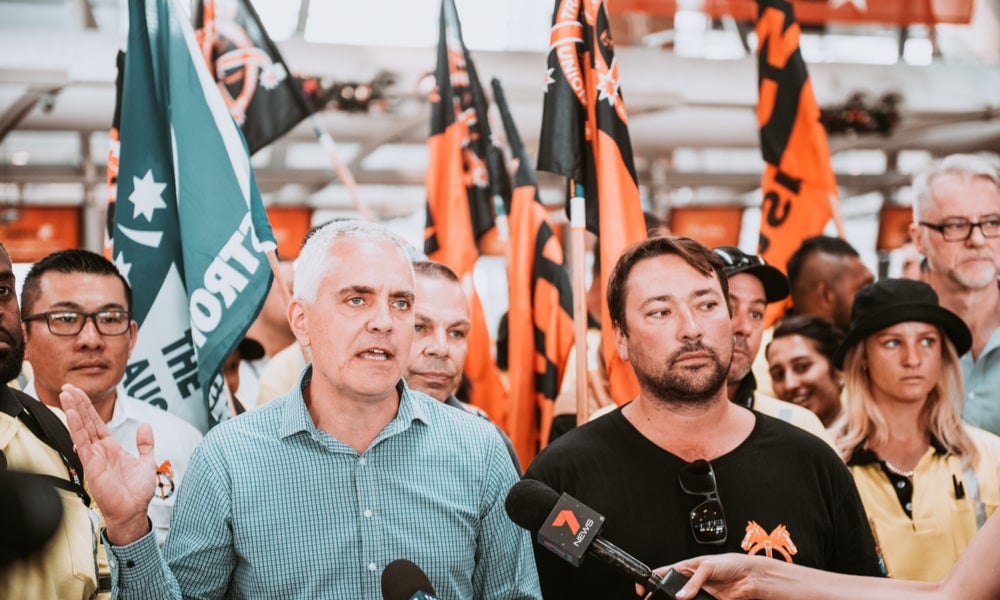Is Scott Morrison's industrial relations peace gambit worth a shot?
Australia’s industrial relations system needs reform but it won’t happen without the key players agreeing to it themselves, writes UNSW Business School’s Richard Holden
Australian Prime Minister Scott Morrison recently announced plans for a potential “grand bargain” on industrial relations.
Speaking at the National Press Club, he framed the issue as one of boosting economic productivity: “We must enable our businesses to earn Australia’s way out of this crisis. And that means focusing on the things that can make their businesses go faster.”
Rather than directly introducing legislation into the parliament, Morrison’s plan involves creating five “working groups” of union and business advocates to look at issues from simplifying awards and the enterprise bargaining system to the treatment of casual workers and “greenfields” agreements for new enterprises
This is shrewd politics. If the working groups find agreement, the government can push the required legislation through parliament with a claim to a mandate. And claim the credit. If it fails, Morrison can say nothing can happen without business and workers agreeing. So the government avoids blame.
But it may also be canny economics.
Going for broker
Perhaps Morrison has realised his real power is not as an advocate but a broker.
This process might have less in common with Australia’s prices and incomes accords of the 1980s, where unions agreed to limit wage claims than with the Dayton Accords, the peace agreement that ended the Bosnian War in 1995.

The accords between the Australian Council of Trade Unions and the Hawke and Keating governments between 1983 and 1991 were a response to the wage-price spirals that plagued advanced economies in the 1970s and early 1980s.
High inflation led to large wage claims, which further fuelled inflation. The 1983 accord broke this spiral by guaranteeing wage increases every six months tied to the consumer price index. As I’ve noted previously: “Once people knew that wages weren’t going to gallop ahead of prices, there was less of a reason to raise prices, which put less pressure on wages, and so on.”
The Dayton Accords (officially the: General Framework Agreement for Peace in Bosnia and Herzegovina) was brokered by the US administration in Dayton, Ohio, in November 1995 between the presidents of Bosnia, Croatia and Serbia.
Booking a room
The shadow minister for industrial relations, Tony Burke, reacted to Morrison’s announcement by saying: “Let’s be clear: all the government has done so far is book a room. This is not an IR agenda – it’s a series of meetings.”
Burke meant this as a criticism, but in fact, it might be a virtue. It’s hard to imagine a deal on industrial relations without representatives of employers and employees agreeing. That agreement may be better served by a government acting as a broker rather than pushing its own specific agenda.

There is an emerging school of thought in economics that coordinating beliefs play a crucial role in reaching value-enhancing deals. Having the participants believe there can be a deal might be the heart of the issue.
That was arguably the role US chief negotiator Richard Holbrooke played in the Dayton Accords, and the role federal industrial relations minister Christian Porter will need to play in this rather different setting.
Very different starting points
That said, the parties don’t agree on all that much – at least as a starting point. ACTU secretary Sally McManus has emphasised that: “We can only secure a better, stronger Australia if working people have permanent, well-paid work and the entitlements that come with it.”
The head of the Business Council of Australia (BCA), Jennifer Westacott, says the issue is needing “a system that delivers higher productivity, letting people work more effectively, produce more and find new and innovative ways to work.”
Can permanence and job security be reconciled with effectiveness and innovation in the workplace? I’m an optimist. But we shall see.

Are the representatives representative?
This possible grand bargain needs to be between employers and employees. Those at the table will be representatives of those groups – namely unions and employer groups such as the BCA and Ai Group.
A crucial question is how representative these representatives are.
As Leigh Sales observed on the ABC’s 7:30 program this week: The vast majority of Australians aren’t members of unions, only 14 per cent of people are. In this process, shouldn’t workers be represented by other voices that more likely speak for them?
In the private sector, union membership is even lower – about 10 per cent. One should ask similar questions of the BCA and Ai Group. For instance, do they represent the views of smaller businesses as faithfully as they do the big ones?
This is crucial because it affects the credibility of any potential deal, and how any benefits are spread. A cosy deal between big business and unions on greenfield construction sites is one thing. A grand bargain that helps workers, not in unions and employers across the economy is quite another.
Will it work?
Morrison did frame the issue adeptly in his address. He was clear about the inputs needed to increase the economic pie: The skilled labour businesses need to draw on, the affordable and reliable energy they need, the research and technology they can draw on and utilise, the investment capital and finance that they can access, the markets they can connect to, the economic infrastructure that supports and connects them, the amount of government regulation they must comply with, and the amount and the efficiency of the taxes they must pay.
Given all that, Australia’s industrial relations system does arguably need reform. But it won’t happen without the key players agreeing to it themselves.
Morrison’s gambit may not work, but it is certainly worth a shot.
Richard Holden is a professor of economics at UNSW Business School. This post first appeared on The Conversation.
